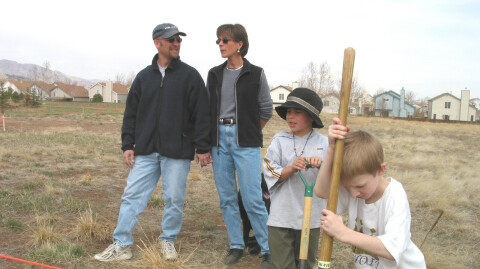
We are talking about the “why” of worship at Waterstone. There are three purposes for worship: 1) to encounter God; 2) to be formed by his Word; 3) to proclaim the gospel. Let’s talk about the second purpose for worship at Waterstone—formation.
The purpose of worship is for God to shape and disciple believers—for them to be transformed. The Church exists to equip believers for ministry (Ephesians 4:11-12), thus the weekend gatherings are not the main event, but rather the encouragement factor for helping us demonstrate the main event—the kingdom of God. Hebrews 10:24-25 speaks of meeting together to “spur” one another “to love and good works.” Thus, worship is to be formative as we submit to practices: reading Scripture, communion and baptism, singing songs, reciting liturgies, saying prayers with the Amen and engaging preaching—all of these transforming us into our future glory-selves now. Aaron Niequist describes this formative purpose: “We obsess over a well-balanced meal that energizes our church into Christlikeness and gospel witness” (The Eternal Current, 27-28).
Worship-as-formation means is that worship gatherings are purposely experiential—more gymnasium than classroom or concert. Worship must be experiential because human beings are not fundamentally thinking beings, not brains on a stick. Rather, made in God’s image, we are defined fundamentally by love. We become what we love (James K.A. Smith, You Are What You Love). Therefore, corporate worship encourages giving to God and to one another actively. The focus is not on what the leadership can do for those who occupy the seats. Worship is not, “Come hear our amazing preaching and gifted artists so you are uplifted and inspired to have a blessed week.” Rather, worship becomes a prayerful, intentional environment that frees and empowers the saints (and guests) to co-create a worship experience both as individuals and Body that helps people connect with God and one another in order to become more like Jesus and live for others.
In the New Testament, the letter to the Hebrews is the closest thing we have to a worship manual for the Church. Hebrews is written to 1st century urban Christians struggling with fear and discouragement such that they are in danger of giving up. They are asking, “If God loves us, why is our life so hard?” The letter’s answer is this: fear and discouragement can be dealt with by fixing our hearts on Jesus. Jesus is better.
Hebrews 3:13-14 reads,
But exhort one another every day, as long as it is called ‘today,’ that none of you may be hardened by the deceitfulness of sin. For we have come to share in Christ, if indeed we hold our original confidence firm to the end.
The word “exhort” is often translated as “counsel,” and the writer of Hebrews is saying that we all need a lot of counseling. We will not make it through life without counseling. Corporate worship is weekly counseling.
In the verses leading up to this encouragement, the writer tells the story of Israel entering the Promised Land. The people are in Kadesh Barnea, on the very edge of the Land (Numbers 13-14). They had experienced God’s miraculous deliverance from oppression. Six hundred thousand men and their families walked through the Red Sea on dry ground! After two years, they make plans to enter, sending in twelve spies. All twelve agree that the land “is flowing with milk and honey.” All twelve also agree that the inhabitants are fierce, fortified and big. Where they disagree is what this intelligence means. Ten spies believe that it is over: “We cannot win.” The other two spies—Joshua and Caleb—speak of their trust in God. They are thinking, “Who’s bigger? Who defines reality?” The people accept the majority report, and what should have been the day of their inheritance becomes the day of their testing. They doubt not only God’s magnitude, but also his goodness. They even ascribe treachery to God, suggesting he intended to bring them to the edge of the Land only to let them die. The result is that only two men over age twenty (Joshua and Caleb) of the six hundred thousand will enter the Promised Land.
Hebrews 3:12 paraphrased is, “Don’t be like them (the people). Watch out that you don’t drift into an unbelieving heart that refuses to believe that God will keep His word.” What really happened to that original generation? They gave up because they confused God with life. They made the mistake of interpreting who God is by what their circumstances are; instead of interpreting their circumstances by whom God is!
This is why we worship. In this world we will have wilderness. Therefore, it is inevitable that unless we get counseling, we are going to become rigid and cynical. We are going to stop trusting and kill the parts of our hearts that hope. The way to avoid losing heart is to get counseling. Corporate worship is God giving counsel; God forming our hearts.
It is not incidental that the Hebrews writer quotes Psalm 95:7 in this Hebrews 3 text. Every Jew had memorized Psalm 95:7 because it was their call to worship every Sabbath evening in the synagogue: Today, if you hear his voice, do not harden your hearts. Week after week, year after year God calls us together to counsel our hearts. The counsel from the letter to the Hebrews says that we need the biggest dose of Jesus we can get every week. Left to ourselves we drift into lives that are self-soaked, small, temporary, and powerless. So we come together to proclaim: Jesus is better. We never get over being saved. We never move on from the gospel that Jesus lived the life we should have lived; he died the death we should have died. Our baptism never dries. We live as if Jesus is alive. We gather to practice resurrection. And we are formed to be like Jesus.
Here is a concrete encouragement for you as you participate in Waterstone worship. Near the end of the letter to the Hebrews, and indeed near the end of most every letter in the New Testament, there is the formative word “Amen” (Hebrews 13:21). “Amen” is the Hebrew word that means “Yes. Agreed. All in.” “Amen” is the deep assent of the worshiper. We say “yes” to God with mind and heart to the beauty and promise and calling of his Son. We say “yes” to God in the opening of our hearts to be formed and transformed into the image of Christ. “All the promises of God find their ‘Yes’ in Christ. That is why we utter the Amen through him to the glory of God” (2 Corinthians 1:20).
We want everything we do in worship at Waterstone to be one massive “AMEN!”
How do we keep the “Amen” in our worship?
Prepare.
Start before we start. Prepare mind and heart to encounter God. Give thought to how you will participate for God, and how you will “spur others on.” Come ready. Can you imagine your frustration if you paid one hundred dollars to hear a performance of Ludwig von Beethoven’s Seventh Symphony, and the orchestra came into the concert hall late? Then the conductor stands before the audience and says, “Wow, have we had a busy month! Lots of travel, several recording sessions, and now here we are. We have not had a chance to rehearse tonight’s concert, but everybody is a good musician so we’ll have a jam session for the next two hours.” Nope.
Participate.
Speak the “Amen.” “Amen” the prayers and the songs and the lines of the message that stir you. A Presbyterian elder once prayed during a worship service: “Lord, let something happen today that is not in the bulletin.” That something is what you bring! And remember that you are decidedly not the audience in worship. As Soren Kierkegaard once wrote, “Think of the act of worship as a drama or a play, but we are not the audience. Worship theater is different. We are the players, and God is our all-consuming audience of the One” (Purity of Heart Is to Will One Thing, 181). The worship team, the pastor, the host—these are the prompters. They aid us in our expressions and unite us in doing what we do before God. It is bad enough to have the prompters doing what the players ought to be doing. Even more, it is profane for the players to presume to play the part of the Audience, the place that only God occupies. In other words, worship is something done by God’s people not for God’s people
When we gather for worship, we are performers in a drama with different parts: speaking, singing, praying, giving money, baptizing and eating bread and drinking wine—all for the delight of God. At the end of the performance, the only applause that matters comes from God.
Do an Exit Interview: “How did I do?”
Typically upon leaving worship we are in audience-mode: “I liked the worship today.” “God really moved me.” “The music was awesome.” “That sermon sank like a rock.” Those are the responses that assume we are there as the audience. The crucial and formative question we need to ask upon leaving is, “What did God get out of it?” That is, “How will I become more like Jesus now?” It’s the same question.




1 Comments
Yes and Amen! Thank you Larry for this thought-provoking reminder, He is our audience and He inhabits the praises of His people!